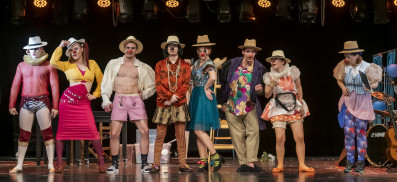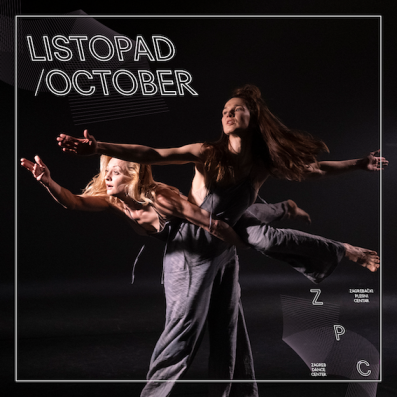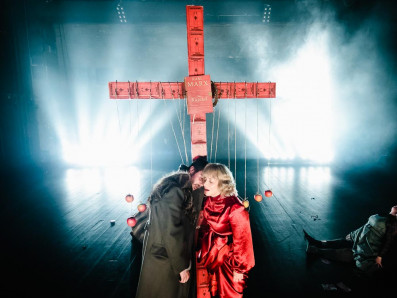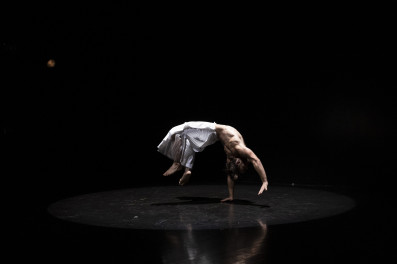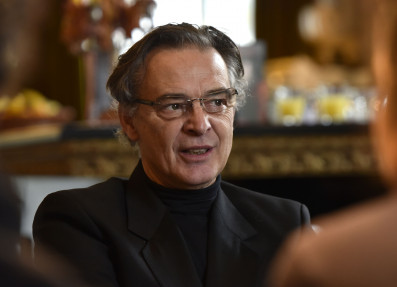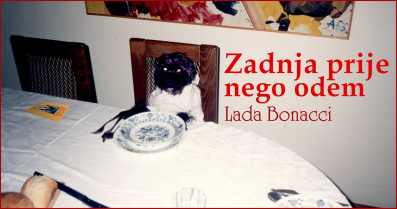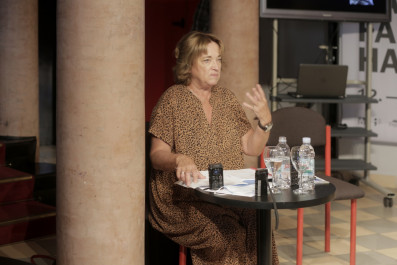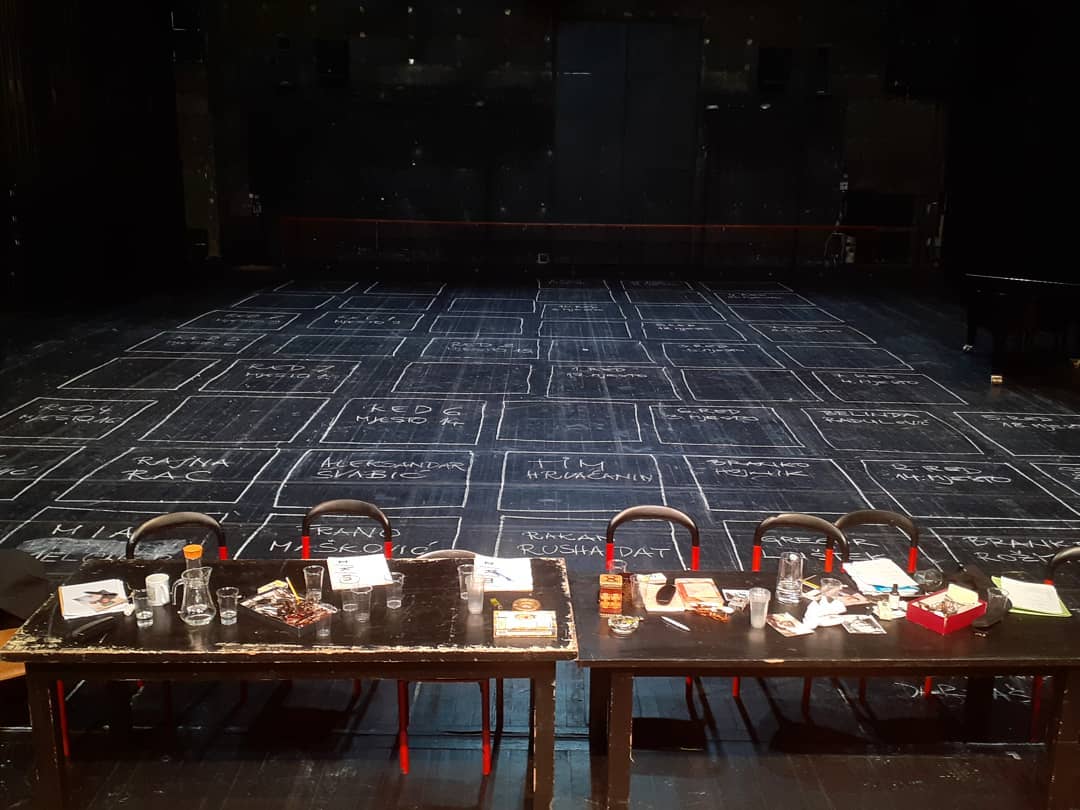
There Will Be No Other End Of The World
On ZKM´s production of Eichmann in Jerusalem
An average human body of a grown man produces around 1750 g of ashes when cremated. If stretched on all four sides, the skin of the aforementioned average man takes up 1,75 square meters. It took a small cubicle of Belgian-made bulletproof glass, marking out mere two-by-two meters of space to pose a safe area for one Adolf Eichmann in Jerusalem during his trial, from April 11th 1961. To December 12th the same year. Finally, fifty-nine years later, in Zagreb, it took eight actors- Katarina Bistrovic Darvas, Dado Cosic, Frano Maskovic, Mia Melcher, Pjer Menincanin, Rakan Rushaidat, Lucija Serbedzija and Vedran Zivolic, the director Jernej Lorenci and a timelapse of almost three and a half hours to execute the play of the utmost evil and, in retrospect, a theatrical dialogue akin to prayer for what is left of humanity.
Everything in the production enacts history, almost palpably. If there was ever a performance wholly dependent on the atmosphere building up minute after a minute, for the author of this text-this was undoubtedly one of the finest examples. The atmosphere is a separate being compassing in omnipresence the core of the narrative, as the dramatic form is here subjugated. The scene opens on a deep, plain stage with something akin to the ballet benches at the far end, two tables with scattered books, papers, cigarettes, ashtrays, perfectly dubbing an interrupted meeting of college professors or some newspaper agency caught between breaks. Some photographs stick out, a man of indeterminable middle age, dry and thin, fit for a character from Kafka´s novels, with headphones on. Whether he is mocking in disapproval or gnawing at some hard-to-get notion is impossible to say. A small tin box, holding perhaps someone´s favourite tea or biscuits and two small caskets filled with thick glasses are to be seen. Eight chairs await as the audience settles in under glaring lights that will almost stubbornly stay on during the entire oncoming time. The actors come out and, what Anne Sexton had called An Awful Rowing Towards God, a process of acquaintance with one of the finest hierarchies of bloodshed begins with their presentation of the material at disposal. There will be no fantasies, no illusions, no justifications and no condemnations here. Taking this title from Czeslaw Milosz´s poem written in Warsaw in 1944. It seems no other end of the world as we know is possible, yet. By the time the play closes, the glasses will be a permanent reminder of the first Nazi criminal to be judged after kidnapping in Israel, the only one to receive a death penalty from the same Court. A tin can holds the ashes playing in place of Eichmann´s remnants drowned by the sea.
Drawing its documentarist character from Hannah Arendt´s Eichmann in Jerusalem, a compilation of reports written originally for New York Times, and its mimetic performativity from Claude Lanzmann´s nine-hours long Shoah, the ensemble moves with a line of factuality delivered with precision and humility. Humbled by what they have experienced through vastly detailed research, the prologue is formed with a sort of equity between us, the audience due to witness what we are used to seeing as a game, and them-the men and women now present and them-taking on the voices and bits of stories intertwined to point to translate a lining of resistance and survival. Or, better yet, the utmost lack of resistance for the better part of the history´s course. Still, not a word of blame was to be heard.
The spatiality is quickly explained in-depth, drawing comparison of the old theatre house in Jerusalem that had been dishevelled and re-built as the courtroom. It has the same dimensions as our stage, so Mia Melcher says. The audience sits much as the original witnesses did. The two tables hunched by piles and piles of evidence also existed, very similar to those on stage. This blankness is fierce and furtive, propelling the “this could have been us” question as the eerie imaginative push. Indeed, by the time the play ends, the semi-darkness will have been used as a gas-room, a concentration camp, a morgue, a graveyard and sometimes, with equal unsettling success, a family room. This facelessness conspires to create a compelling mutability of terror. The method of this play, its sequential presence through engaging the actors in statements and then enactment- with brilliant transformative powers eliciting every one of them to become the voice of the dead or the voice of the oppressor without losing the Brechtian quality of narration-illuminates the ultimate sacrifice we make towards our past and future. It belongs to us through heroism and cowardice alike, and it is easy to fall prey to the conclusive details.
A man with a forlorn look sings with waning strength something that can be a happy folk song or a requiem. Perhaps there was a time when the two didn´t differ as much. “To the sky” he later says-“ the black smoke rose to the skies”. A man and a woman took up the old house, much finely furniture, from Jews who were “good Jews” in their village. The rest stank. A repetition of interrogation made by Lanzmann follows, for the pair to recite over and over again as the noise rises in the gradation of banality and shame. The best barber and his colleague departed to Auschwitz with their quick hands to chomp up a simple boyish haircut in under 3 minutes. Such are the stories brought in quick successions from the actors. Sometimes they sing. Sometimes a man stands almost confused, ordered by Lanzmann- Rushaidat to if he would please, show what he had done for four years. Looking stupefied at first, he then glazes and says he needs help. Cosic and Zivolic step in as dead bodies, laying atop of one another. Suddenly the man is alive and what he does, dragging them out, seems simple physical labour that will later cost him some backache and a place in Heavens. He had to drag out the murdered victims murdered by gas, one after the other. There is a moveable set of silences in such places, same as when we watch the entire crew huddled in a corner, made smaller and more solid by the minute in their naked skins and voiceless resignation. They are inside and everything has already happened to them, everything except death.
If they have expected the devil as a red, flaming monster, he failed to impress: the monster is almost always in the mundanity of our consciousness. Arendt's report on the banality of evil alone echoes Eichmann´s defence that is meek as much as it is almost bureaucratically concise. There was a mechanism of one-way dying, a total collapse of will. Every monster has a human face, every murder may have mastered before the role of victim. The monstrosity went through the realm of idealism into the disarming quality of terror for nations Ethically monochromatic, black or white, Jew or not a Jew, Homosexual or not, a Gypsy or not, a mentally retarded or not. More than didactical, this break of consistency in an individual decision, this murdering of identity and moulding, shaping the humanity through a vision of superior motives given by chance birth and belonging to a race is still humiliating. This play reflects, like broken glass, in the second part a more recent Balkan history, exactly neared to our generations as the Shoah was to the interrogated participants. We cannot exonerate a choice from the realm of history. This one man, one man alone, swearing he feels guilty “only in the eyes of God, not in front of the Court of Israel”, this man who “has never killed a Jew with his hands”-who has rather masterminded, executed and logistically designed the path of death for almost half a million people-him we may exonerate by an example from anything human. But our essence is still fallible and Arendt´s coming back to life meant only one thing-responsibility for one´s acts. Because here we are chosen for a chamber experience of human re-evaluation, cornered and facing our evasiveness towards resistance, our inability to protect our equal.
Perhaps it is good to revisit this play as one recalls Malick´s recent masterpiece A Hidden Life, as they are both leaning on the same questions beating out in my ears after I left the theatre that night. Firstly-what have we allowed to be done? What have we done? And, finally, what would I have done?



